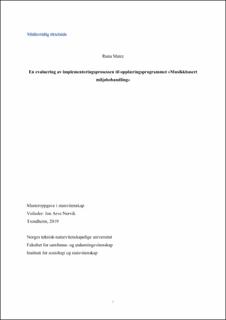| dc.description.abstract | This master thesis studies and evaluates the implementation of the public programme “Musikkbasert miljøbehandling” (music therapy). The programme is run by Nord University and National Centre for Culture, Health and Care, commissioned by the Directorate of Health. Through participation, employees and managers in the health and social service sector will learn how to strategically integrate music, song and movement in daily care. The purpose of this master thesis is to investigate whether participants start to use the tools and the knowledge they ave obtained through participation, in their work place. Which catalysts and barriers in the process affects this implementation? Further, is music therapy taught to employees who have not participated in the music programme, so that the treatment is implemented holistically? The training programme started with a course for employees at nursing homes, which is the basis for this study. Four nursing homes, geographically spread in Norway, were chosen. In-depth interviews with seven employees who participated in the training program, as well as interviews with their respective leaders, were conducted. In addition, interview of an employee at the Norwegian Directorate of Health and an employee at the National Centre for Culture, Health and Care were carried out. The study shows that all course participants were very pleased with the training program and want to use the treatment afterwards in their work. They also experienced that their leaders were positive in the process. Three months after the course was finished, all course participants in this study used music therapy in their work. And they stated hat they see great effect of the treatment method on the patients. More than one year after course participation, however, several of the course participants have challenges with using music therapy in the nursing homes. The challenges that particularly affected this was lack of time and sufficient/enough equipment. Lack of accountability and ollow-up also affected the decline in use. The leaders and department managers seemed to be little involved with the implementation and use, apart from having a positive attitude and communicating that they want it to be used. The course participants thus had a lot of responsibility with the implementation. The participants expressed one year later that they still want to use music therapy in care, but the challenges named above makes it difficult. All nursing homes have, with varying degrees, trained employees who did not attend the course in music herapy. In one of the four nursing homes, the course participant interviewed informs that they have managed to train other employees to independently assess patients and use the treatment ne year after course participation. | en_US |
